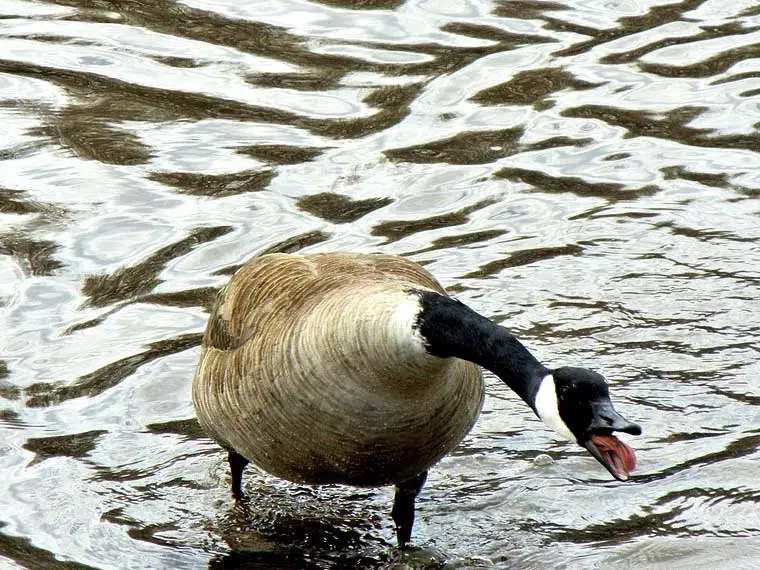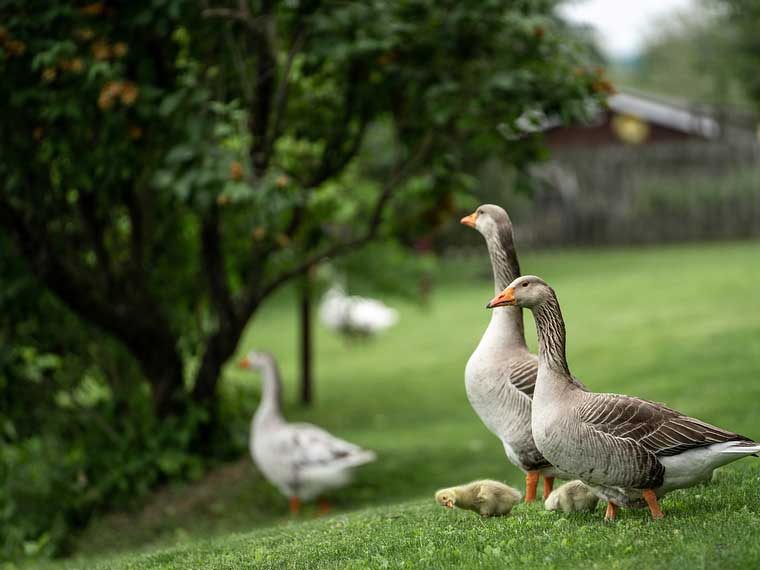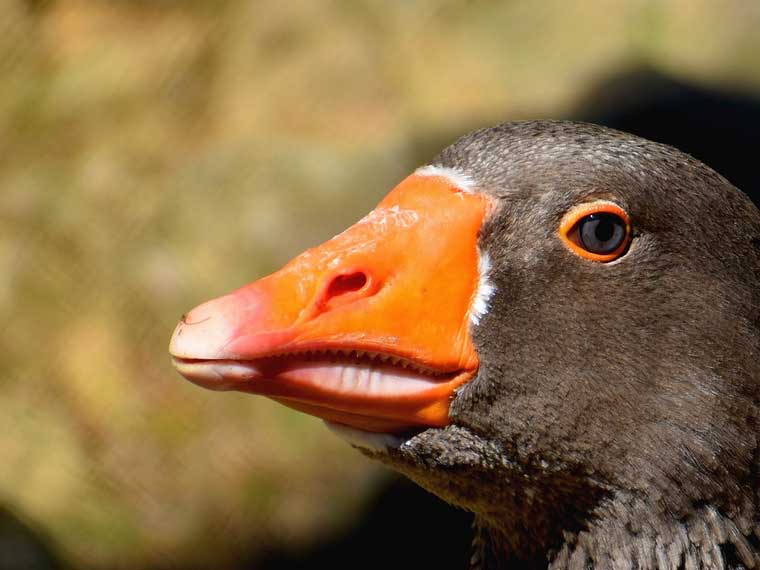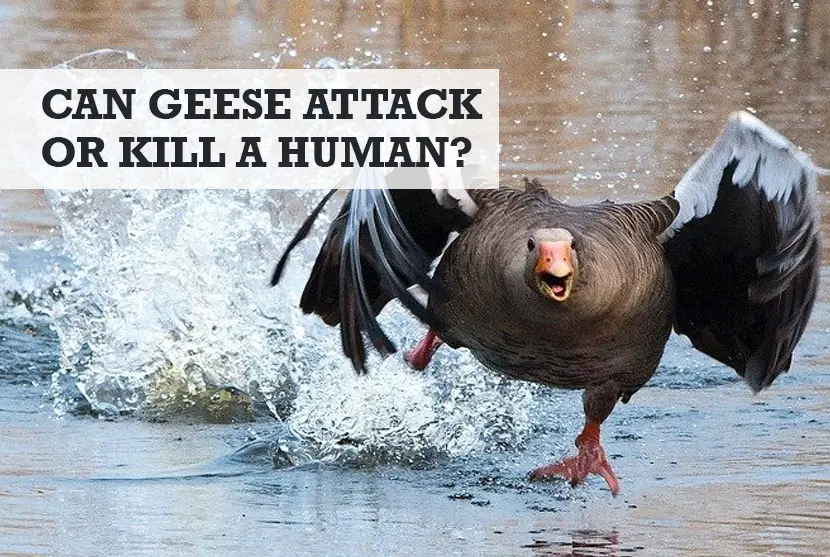Ever since I was a kid, I’ve been wary of geese. Although they aren’t scary in appearance they’re certainly intimidating when they hiss and stretch their wings as a warning.
Unfortunately, this has happened to me once: I now try to avoid them in my local outdoor park. However, this got me wondering, can geese attack you, or even kill a human? I asked some experts and tried to find at goose attack statistics.
Can geese attack humans? Yes, geese can attack you, particularly during the spring and early summer months when they are nesting. However, these incidents rarely result in serious injuries to humans.
So that is the short answer to my first question. However, if you want to find out whether you can die from a goose attack, read on.
Can you get killed by a goose?
Let’s cut to the chase; I cannot find any recorded instances of a human dying from a goose attack. The honest truth is you cannot be killed by a goose. But that doesn’t mean a goose attack won’t hurt you – the opposite is true; it can be very painful and dangerous.

Thankfully, pretty much all species of geese, such as Canada, Brent, Greylag, and Snow Goose, cannot kill or seriously hurt a person.
What’s more, there has never been a documented case of a human dying from a goose attack, so you can rest easy the next time you bump into a group of them.
Are geese dangerous to humans?
Geese are dangerous to humans, but a goose will not kill you. But a goose will hurt you, and here’s why according to an expert opinion I found online:
Geese do some considerable bruising when they attack a human. A bite from a goose can even cut you, particularly so if the goose twists the beak when biting you. You should not approach an angry goose, as they can deliver a lot of pain. Larger geese have wingspans of up to 6 feet and are very strong, so to be beaten by the wings will hurt.
But, as I mentioned above, geese aren’t overly dangerous and are unlikely to cause life-changing injuries. They might be able to break and arm or give you heavy bruising though.
Thankfully it’s usually just a bluff when a goose hisses or starts coming at you. It’s still not a good idea to aggravate them as they can do damage when cornered or threatened.
It’s also a good idea to keep your children or pets away from them, especially when they’re breeding… geese attack humans when they feel threatened and hemmed in – more on that below.
Why do geese attack humans?
In general, it’s not unheard of for Canada Geese to attack humans. Other geese can be aggressive, especially farmyard geese, but the Canada Goose is famous for its short temper and willingness to pursuit people even after they’ve started running away.
In fact, you’ve probably seen a video of this behavior online before.
Will Canadian geese attack you?
Yes, as you can see from the video above, Canadian geese can attack you. As the most common geese in parks and outdoor spaces, they generally tend to live close to humans.
As a result, humans, and Canada Geese constantly cross paths and this naturally results in attacks happening more regularly than with any other type of geese.
More often these encounters happen in the spring when the birds are nesting and protecting their eggs or goslings. Canada Geese will quickly become aggressive if they believe their offspring are being threatened.

Unfortunately, their nests aren’t always immediately visible, and this can often lead to unsuspecting runners or dog walkers being attacked or chased.
But, as with before, there are no recorded instances where a Canadian goose has killed a human, but they might deliver a hard bite and a wing whack.
How can geese hurt you (more details)?
It’s best not to pick a fight with a goose if you can. Although most goose attacks on humans only result in minor injuries, severe injuries are not all that uncommon either.
It’s important to remember that geese are huge birds, with adult Canada geese weighing up to 6.5 kg. Although that might not sound much, just imagine a 6.5kg mass of feathers flying at you at high speed.
In some cases, geese attacks have resulted in individuals leaving the area with broken bones, head trauma, even open wounds.
Handy Hint: It’s not true that geese sleep in nests. Where they sleep might actually surprise you, it’s not where you might think.
However, it’s also common for people to hurt themselves during goose attacks, either by running into trees or falling over objects in their panic to escape – it’s not always the goose that inflicts the injuries!
So, you won’t die from a goose attack, but the worst-case scenario might be that a person could risk drowning if a large group of geese attacked them while swimming, although this is pretty unlikely.
However, the Spur-winged Goose could potentially cause you life-threatening injuries if you wandered too close. Although not strictly a species of goose (they’re closer to ducks than geese), these large birds have spurs on their wrist joints which allow them to easily dispatch birds their size.

Furthermore, some species of Spur-winged Geese are poisonous as a result of their habit of consuming toxin-producing beetles. Thankfully, you’re unlikely to come across these birds in your local park as they are native to parts of Africa.
Spur-Winged Geese are testament to the saying, “you are what you eat’’. Spur-Winged Geese absorb poisons from toxic beetles they occasionally ingest, making their own flesh deadly to consume.
One Kind Planet, https://onekindplanet.org/animal/spur-winged-goose
What are the signs a goose is going to attack?
Being able to spot the signs of a potential goose attack can save you from being hurt. Often, geese will display certain warning signs when they are thinking about attacking.
At first, they will tilt their heads back to indicate that they’ve deemed you a threat. They may also rear up and flap their wings. From here, they will point their neck in a vertical line, and begin to hiss or honk as a warning.
Finally, they will begin to bobble their head up and down and approach you at a slow walk.
How do you stop a goose attack?
There are a couple of things you can do if you find yourself being attacked by a Canada Goose. Firstly, most Canada Geese don’t like prolonged eye contact and will perceive you as a threat if you stare them down. Unlike other smaller birds, they have incredible vision and can tell what your body language is saying.
Try to keep your eyes locked on the bird and make sure not to turn and run. After this, slowly begin to walk backward while watching out for obstacles that could trip you over. If you fall, this could startle the goose and cause it to continue its attack. Slow and measured movements are key to keeping these birds calm!
Next, you should refrain from acting aggressive or trying to hit or kick the goose as this will only anger it further. This could cause other geese nearby to get involved, too! If the goose starts flying at you, dodge to the side and keep your body facing towards it.
Eventually, when you get far enough away, it should lose interest and return to where its nest or goslings are located.
Preventing a goose attack can be as simple as not feeding them at the park. When they’re regularly fed, they will start to lose their fear of humans and this can have disastrous consequences, especially during the breeding season.
Next, it’s just a matter of keeping your distance from geese when they have goslings or eggs.
What to do if a goose attacks you?
If you’re a fan of cartoons, you may have come across geese being portrayed as gentle but no-nonsense birds.
When one goose in a group is acting aggressively towards you, responding aggressively as well will only anger the other geese and make things worse for you.
Though it may not sound like the bravest thing to do, when you’re being attacked by geese, regardless of their number, the best thing is to slowly but cautiously back away from the situation.
Even if you’re bigger than the geese and equipped with something to strike back, you should take into consideration that geese like other animals are not wired by evolution to be rational creatures.
So, if you decide to go at it with a group of geese, just know it would be a fight to the death, at least that’s how the irrational animals are wired to think.
Conclusion
I hope that I’ve put your mind at ease a little. I certainly have my own, as I now know I won’t be killed by a goose anytime soon. I will still be keeping my distance though as I don’t want to be hurt by a goose whose got me in his sights!
You might also like…
- Why geese like to stand on one leg
- How oyster shells can be good (or bad) for chickens
- What to feed a baby dove that falls from a nest
Image in header via https://pixabay.com/photos/greylag-goose-goose-water-bird-2139296/

